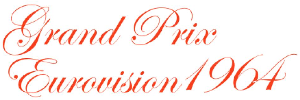1964 Eurovision Song Contest
| Eurovision Song Contest 1964 | |
|---|---|
 |
|
| Dates | |
| Final | 21 March 1964 |
| Host | |
| Venue |
Tivolis Koncertsal Copenhagen, Denmark |
| Presenter(s) | Lotte Wæver |
| Conductor | Kai Mortensen |
| Executive supervisor | Miroslav Vilček |
| Host broadcaster | Danmarks Radio (DR) |
| Interval act | Ballet-harlequinade |
| Participants | |
| Number of entries | 16 |
| Debuting countries |
|
| Returning countries | None |
| Withdrawing countries |
|
| Vote | |
| Voting system | Ten-member juries awarded points (5, 3 and 1) to their three favourite songs. |
| Nul points | |
| Winning song |
"Non ho l'età" |
The Eurovision Song Contest 1964 was the ninth edition of the annual Eurovision Song Contest. It was held in Copenhagen, the capital of Denmark, after the country's victory in the 1963 edition. Italy won the contest for the first time scoring 49 points with the song "Non ho l'età", performed by Gigliola Cinquetti.
The host venue for the contest was Tivolis Koncertsal (Tivoli Concert Hall) in Denmark's capital city Copenhagen, which lies within Denmark's famous amusement park and pleasure garden Tivoli Gardens. The park, alluding by its name to the Jardin de Tivoli that existed in Paris, was opened on 15 August 1843, and is the second oldest amusement park in the world, after Dyrehavsbakken in nearby Klampenborg.
Each country had 10 jury members who distributed three points among their one, two, or three favourite songs. The points were totaled and the first, second, and third placed songs were awarded 5, 3, and 1 votes in order. If only one song got every point within the jury it would get all 9 points. If only two songs were chosen, the songs would get 6 and 3 points in order.
A political protest occurred after the Swiss entry: a man trespassed onto the stage holding a banner that read "Boycott Franco & Salazar". Whilst this was going on, television viewers were shown a shot of the scoreboard; once the man was removed the contest went on.
The immediate response of the Koncertsal audience to the Italian entry was markedly enthusiastic and prolonged and, most unusually for a contest performance, after leaving the stage Gigliola Cinquetti was allowed to return to take a second bow. Her performance was given an unscheduled repeat on British television the following afternoon. In the event, she won the most crushing victory in the history of the contest, with a score almost three times that of her nearest rival, a feat extremely unlikely ever to be beaten under the post-1974 scoring system.
...
Wikipedia


